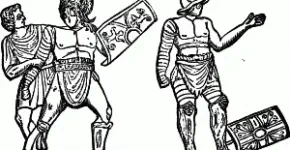More wars: Samnites and Pyrrhus

All the short histories of Rome skip to the Punic Wars, so I wanted to read about Pyrrhus by the end of the week.
In Charlotte Yonge’s Book we read through chapters 13-16 today.
There were lots of incidents to act out with much drama and enthusiasm.
One contrast came between Manlius breaking ranks to kill a Latin and in turn being punished with death at the hands of his own father, and then later Fabricius escaping death for disobedience by appealing to the Senate.
Off topic, but this post popped up today: a roman road from 312BC, still in use today
Getting along to Pyrrhus, I had this map up on the screen:
We have a historical atlas which shows Sicily and Southern Italy being populated by Greeks.
Also, Yonge’s account is very brief and there is more background to the Tarentine Rome dispute on Wikipedia – not just Tarentines being proud and lazy, but pre-existing treaties being violated as Rome keeps growing.
That quote about the Pyrrhic Victory I thought would be a good one for a little bit of Latin work.
The Historian Orosius gives it as “Another such victory and I come back to Epirus alone”
- Ne
<dd class='' style='margin: 0; padding: 0'>
Not
</dd>
- ego
<dd class='' style='margin: 0; padding: 0'>
I
</dd>
- si
<dd class='' style='margin: 0; padding: 0'>
if
</dd>
- iterum
<dd class='' style='margin: 0; padding: 0'>
again
</dd>
- eodem
<dd class='' style='margin: 0; padding: 0'>
such
</dd>
- modo
<dd class='' style='margin: 0; padding: 0'>
way
</dd>
- uicero,
<dd class='' style='margin: 0; padding: 0'>
victory,
</dd>
- sine
<dd class='' style='margin: 0; padding: 0'>
without
</dd>
- ullo
<dd class='' style='margin: 0; padding: 0'>
any
</dd>
- milite
<dd class='' style='margin: 0; padding: 0'>
soldier
</dd>
- Epirum
<dd class='' style='margin: 0; padding: 0'>
to Ephesus
</dd>
- reuertar
<dd class='' style='margin: 0; padding: 0'>
return
</dd>
But Plutarch’s quote is snappier “If we are victorious in one more battle with the Romans, we shall be utterly ruined.” – but he wrote in Greek and I have trouble sorting out words there.
- ‘ἂν
<dd class='' style='margin: 0; padding: 0'>
an
</dd>
<dd class='' style='margin: 0; padding: 0'>
he came
</dd>
- ἔτι
<dd class='' style='margin: 0; padding: 0'>
eti
</dd>
<dd class='' style='margin: 0; padding: 0'>
yet
</dd>
- μίαν
<dd class='' style='margin: 0; padding: 0'>
mian
</dd>
<dd class='' style='margin: 0; padding: 0'>
one more
</dd>
- μάχην
<dd class='' style='margin: 0; padding: 0'>
machen
</dd>
<dd class='' style='margin: 0; padding: 0'>
to wish to fight
</dd>
- Ῥωμαίους
<dd class='' style='margin: 0; padding: 0'>
Romaious
</dd>
<dd class='' style='margin: 0; padding: 0'>
Romans
</dd>
- νικήσωμεν,
<dd class='' style='margin: 0; padding: 0'>
nikedomen
</dd>
<dd class='' style='margin: 0; padding: 0'>
we conquer
</dd>
- ἀπολούμεθα
<dd class='' style='margin: 0; padding: 0'>
apoloumetha
</dd>
<dd class='' style='margin: 0; padding: 0'>
we are destroyed
</dd>
- παντελῶς.’
<dd class='' style='margin: 0; padding: 0'>
pantelos
</dd>
<dd class='' style='margin: 0; padding: 0'>
totally
</dd>
That’s a very rough stab from The Perseus Project’s page.
But I got to point out that NIKE means Victory, and revise a bit of the Greek alphabet which is always good.
And Elephants.
